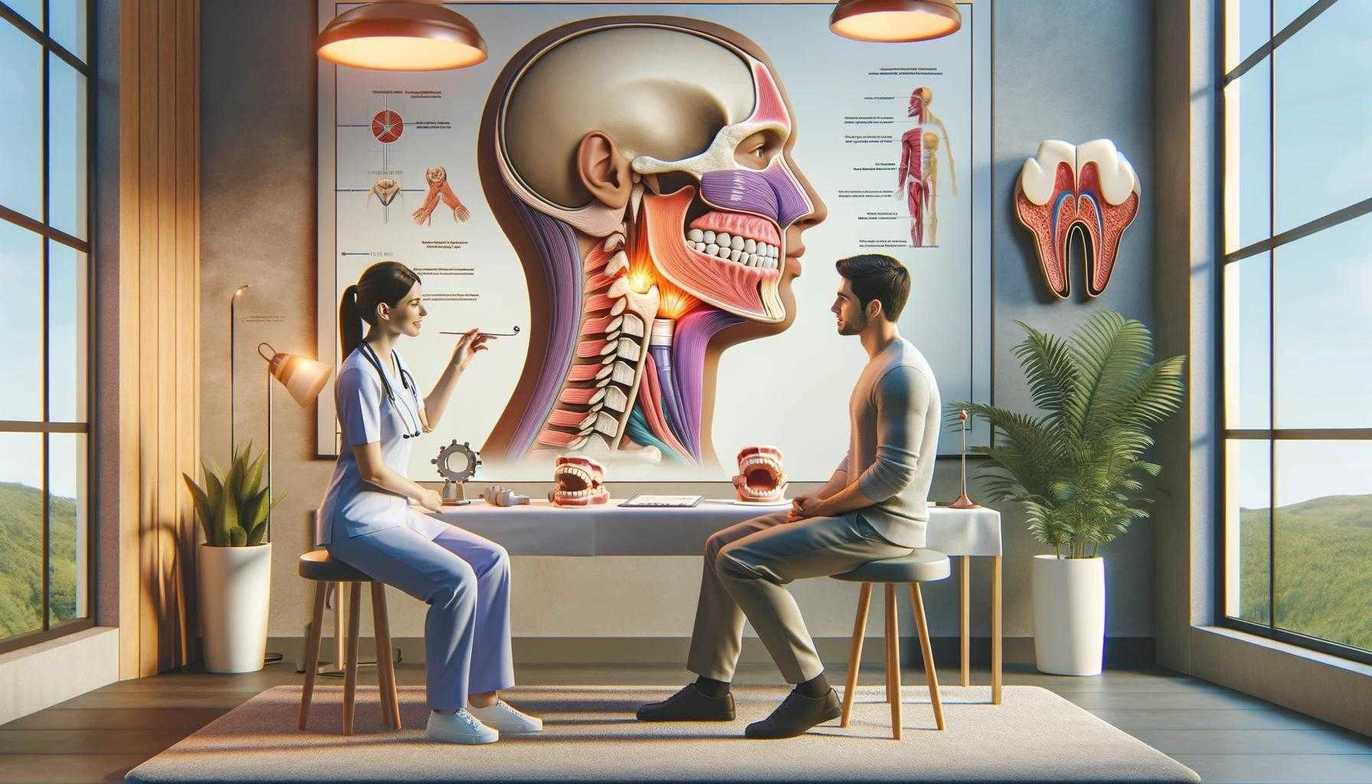
Comprehensive Guide: Managing TMJ Disorder with Chiropractic Care and Physiotherapy
Introduction:
Temporomandibular Joint Disorder (TMJ) is a condition that affects the joint connecting your jawbone to your skull, causing pain, discomfort, and even frustrating clicking or popping sounds during jaw movement. For many individuals, TMJ disorder becomes a persistent issue that impacts daily life, from chewing to speaking and even resting. Fortunately, understanding the nature of TMJ, recognizing the symptoms, and seeking the right treatments can lead to significant relief and recovery.
At Motion Pro Health in Burnaby, we offer a comprehensive approach to treating TMJ disorder, combining chiropractic care and physiotherapy. These treatments have proven highly effective in managing TMJ symptoms by addressing both the structural and muscular causes of the disorder. This guide will explore the causes and symptoms of TMJ disorder, explain how chiropractic care and physiotherapy can help, and highlight the benefits of seeking professional care at Motion Pro Health.
Understanding TMJ Disorder:
The temporomandibular joint (TMJ) connects your jawbone to your skull, allowing for the movements necessary for speaking, chewing, and yawning. TMJ disorder refers to any dysfunction in this joint or the surrounding muscles, leading to pain, stiffness, and difficulties with jaw movement. The exact cause of TMJ disorder can vary from person to person, but common contributing factors include:
-
Injury or Trauma: A direct blow or injury to the jaw or head can damage the temporomandibular joint, leading to pain and dysfunction.
-
Arthritis: In some cases, arthritis can affect the TMJ, causing inflammation and pain in the joint.
-
Teeth Grinding (Bruxism): Chronic teeth grinding or clenching can put excessive pressure on the TMJ, leading to pain, tension, and muscle fatigue.
-
Stress: Emotional stress often leads to increased muscle tension, particularly in the jaw and neck, which can exacerbate TMJ symptoms.
Identifying the underlying cause of TMJ disorder is crucial for developing an effective treatment plan. Left untreated, TMJ symptoms can worsen over time, leading to chronic pain, limited jaw mobility, and difficulty performing everyday tasks like eating or speaking.
Common Symptoms of TMJ Disorder:
TMJ disorder presents a range of symptoms, many of which affect not only the jaw but also the surrounding areas like the neck and face. The most common symptoms of TMJ disorder include:
-
Jaw Pain or Tenderness: Persistent pain or discomfort in the jaw, particularly when chewing, talking, or opening the mouth wide.
-
Aching Pain Around the Ear: TMJ pain often radiates to the areas around the ear, leading to earaches or a feeling of fullness in the ear.
-
Difficulty Chewing: Many individuals with TMJ disorder find that chewing becomes uncomfortable or painful, particularly with tougher foods.
-
Clicking or Popping Sounds: A clicking, popping, or grating sound when opening or closing the mouth is a hallmark symptom of TMJ disorder. While these sounds may not always be painful, they are a clear indicator of joint dysfunction.
-
Jaw Locking: In severe cases, the jaw may lock, making it difficult or impossible to fully open or close the mouth.
These symptoms can vary in severity and frequency, but they tend to worsen over time if left untreated. The impact on daily life can be significant, which is why early intervention and professional care are essential.
How Chiropractic and Physiotherapy Can Help:
TMJ disorder is a multifaceted condition that affects the musculoskeletal system, making chiropractic care and physiotherapy highly effective treatment options. Both approaches focus on addressing the root causes of TMJ dysfunction, such as misalignments, muscle tension, and improper jaw mechanics.
Chiropractic Care for TMJ:
Chiropractic care offers a non-invasive approach to treating TMJ disorder by focusing on the alignment and function of the musculoskeletal system, particularly the jaw and spine. Chiropractic adjustments and soft tissue therapies can significantly alleviate TMJ symptoms.
-
Adjustments: Chiropractors use gentle, precise adjustments to realign the jaw and surrounding structures. These adjustments help reduce tension in the temporomandibular joint, improve alignment, and alleviate pain. In many cases, misalignment in the spine or neck can also contribute to TMJ issues, so chiropractors may address these areas as well.
-
Soft Tissue Therapy: Chiropractic care often incorporates soft tissue techniques, such as massage or myofascial release, to relieve tension in the muscles around the jaw. Tightness in the jaw muscles can contribute to pain and dysfunction, so releasing this tension is crucial for improving jaw mobility.
-
Jaw Exercises: Chiropractors may recommend specific exercises to strengthen the jaw muscles and improve flexibility. These exercises can help patients regain normal jaw movement and prevent further strain on the TMJ.
Physiotherapy for TMJ:
Physiotherapy provides a comprehensive approach to TMJ treatment by combining hands-on techniques with therapeutic exercises and patient education. Physiotherapists focus on restoring proper jaw function, relieving pain, and improving overall mobility.
-
Manual Therapy: Physiotherapists use manual techniques to mobilize the jaw joint and relax the surrounding muscles. These hands-on methods help reduce stiffness and improve the range of motion in the TMJ, making it easier to open and close the mouth without discomfort.
-
Therapeutic Exercises: A key component of physiotherapy for TMJ is the development of a personalized exercise program. These exercises strengthen the muscles that support the jaw, improve coordination, and enhance joint flexibility. Regularly performing these exercises helps alleviate pain and prevents future issues.
-
Patient Education: Physiotherapists provide patients with guidance on how to manage their TMJ symptoms at home. This includes advice on posture, jaw positioning, and stress management techniques to minimize jaw tension. Learning how to use the jaw properly can prevent the recurrence of TMJ symptoms.
By combining chiropractic adjustments with physiotherapy techniques, patients receive a comprehensive treatment plan that addresses both the structural and muscular components of TMJ disorder.
What Does Treatment Look Like?
At Motion Pro Health, we take a holistic approach to treating TMJ disorder. Our team of experienced chiropractors and physiotherapists collaborates to create personalized treatment plans tailored to each patient's unique needs. Treatment typically begins with a thorough assessment of the patient's jaw mechanics, muscle tension, and overall posture.
A combination of chiropractic care and physiotherapy is often recommended to ensure that both the underlying causes of TMJ disorder and the symptoms are effectively treated. Chiropractic adjustments may be used to realign the jaw and spine, while manual therapy and exercises from physiotherapy focus on relieving muscle tension and improving jaw function. Our goal is to provide long-lasting relief from TMJ symptoms while preventing future issues.
Visit Motion Pro Health in Burnaby:
If you're struggling with TMJ disorder, visiting Motion Pro Health in Burnaby could be the turning point in your journey to relief. Our clinic offers a multidisciplinary approach, combining the expertise of chiropractors and physiotherapists to provide comprehensive treatment for TMJ symptoms. Whether you're dealing with jaw pain, clicking sounds, or difficulty chewing, our experienced team is here to help.
At Motion Pro Health, we understand the impact TMJ disorder can have on your daily life and overall well-being. Our personalized treatment plans are designed to restore your jaw function, relieve pain, and improve your quality of life. We take a compassionate, evidence-based approach to care, ensuring that each patient receives the attention and treatment they deserve.
Don’t let TMJ disorder control your life. Contact Motion Pro Health today to schedule your consultation and take the first step toward a pain-free, healthier future.
Learn more about our chiropractic services
Learn more about our physiotherapy services
If you found this blog post helpful, please consider giving us a 5-star review on Google. Your feedback helps us continue providing valuable content to our community. Thank you for your support!
Click to leave a google review
Disclaimer: Personalized Care is Key
Please note that all information provided here is general and should not be taken as specific medical advice for your condition. Every injury and recovery process is unique. For professional advice tailored to your specific needs, we encourage you to come in for a consultation at Motion Pro Health. Our experienced RMTs, chiropractors and physiotherapists will assess your situation and provide a personalized treatment plan to help you recover effectively.

Aghar Al-Qusus
Contact Me


